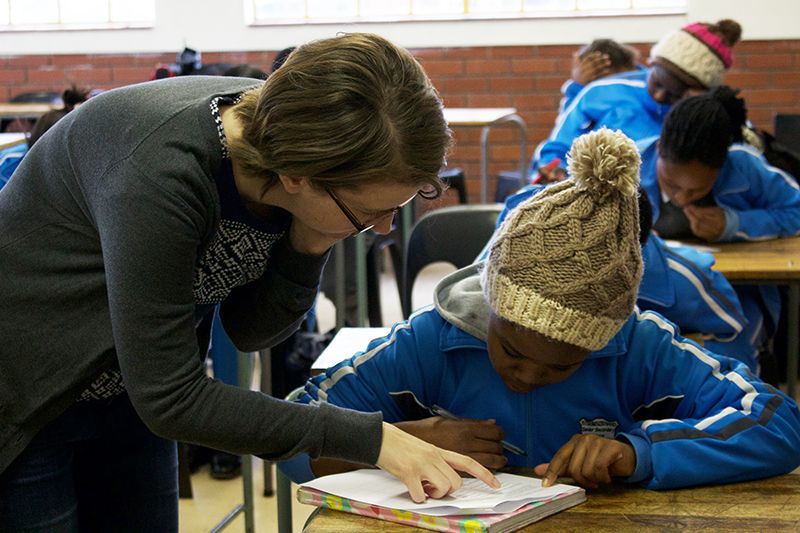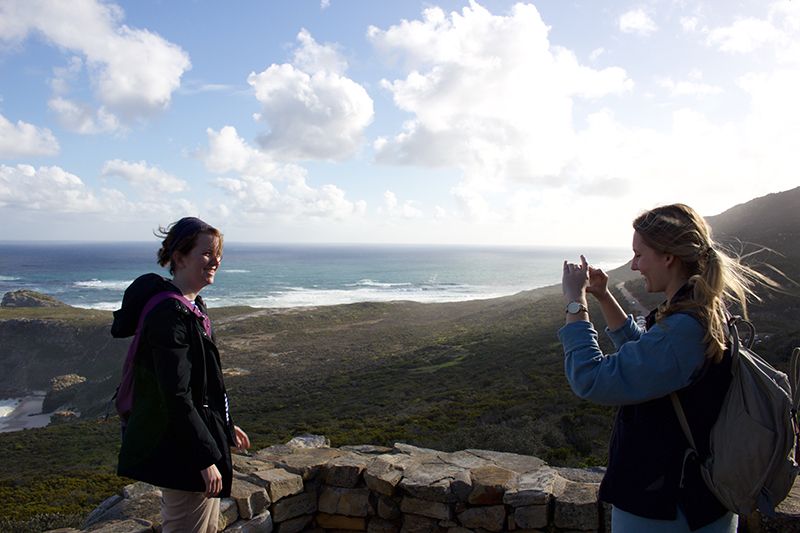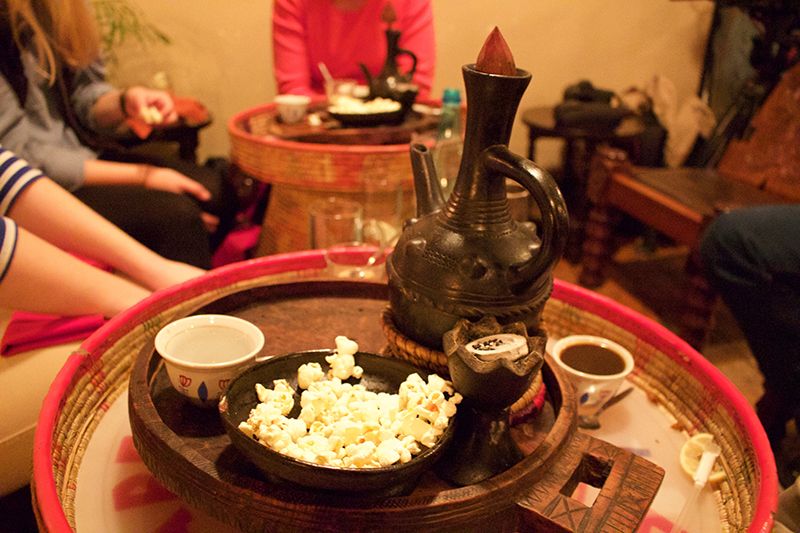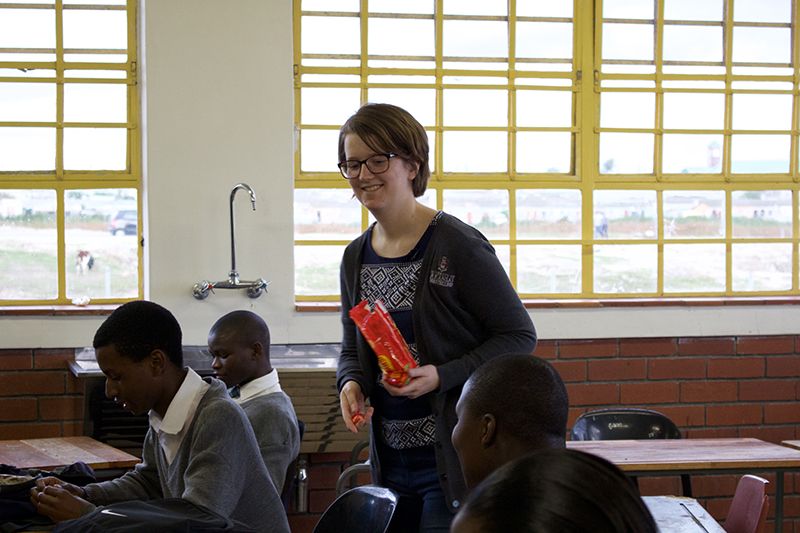
Chelsea Hodge rewards students at Intsebenziswano Senior Secondary School who have completed a survey. The goal? Determine why only 18% of students in Philippi Township go on to university or technical school – and ultimately, help to remove barriers to higher education.
Honors College staffer (and alumna fellow) Chelsea Hodge is wrapping up two months in Cape Town, S. Africa, where she has been working with high school students in Philippi township. Only 18% of students in this impoverished area go on to study at a university or technical school. Chelsea and honors accounting major Rebecca Francis have been working with the South African Education and Environment Project to design and administer a survey that will identify the gaps that block the path to higher education, and how the SAEP can help fill those gaps.
In many respects, Cape Town feels very comfortable/western/European – whatever adjective you want to use. The city is beautiful, cosmopolitan, and vibrant. No matter where you are, your view is dominated by Table Mountain. The ocean runs along the eastern side of the city. There are beautiful gardens, giant shopping malls, and world-class restaurants. We’ve already been to the ballet, to the theater, and to the symphony! Yet this is the side of Cape Town that is seen by the casual observer, the tourist who drops in for a hike up the mountain and a jaunt over to Kruger for a safari. Cape Town, like much of South Africa, is riddled with poverty, racial strife, and an abundance of problems leftover from the apartheid regime. You can see poverty and rampant drug use even in the “nice” parts of the city; once you venture into the Cape Flats and townships, the problems hit you in the face.
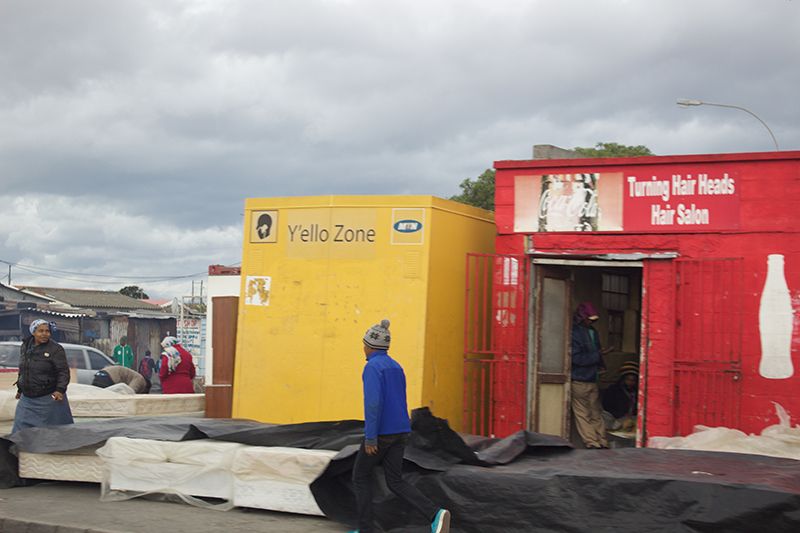
In Philippi Township, most people live in metal shacks without running water. Multiple families share access to portable toilets provided by the government.
But I’m not writing a blog post about all of Cape Town’s problems. That would be impossible, anyway! My point is that Cape Town is a contradiction: fabulously wealthy and viciously poor; naturally beautiful but scarred by neighborhoods born of apartheid. The country has worked for more than twenty years to overcome its past, and though the struggle is far from over, great progress has been made. And the city is full of incredibly kind, friendly people who love this city and this country. I have loved every moment I’ve spent here, and I’ve learned a great deal about tackling these problems, problems that are quite similar to those we face in the USA.
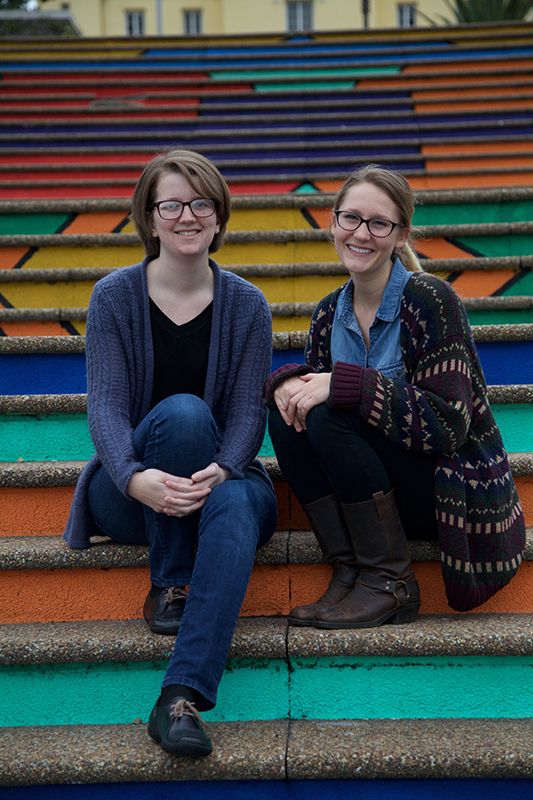
Rebecca Francis, right, helped Chelsea to develop and administer the survey and provided good company in a new city, as well.
Rebecca and I are in Cape Town doing a research project for the South African Education and Environment Project. SAEP is a pretty incredible organization. They run education programs in one of the townships in the Cape Flats, Philippi, from pre-K all the way up through university. Philippi is essentially a shantytown. Homes and businesses are made of tin sheets, with no protection from the rain or cold. Because Philippi is an established township, the city has electricity and provides trash services. The residents also have portable toilets; a small group of residents will share one toilet and everyone in that group has a key only to that toilet (and to think I complained about sharing my bathroom with my sister). Residents also share communal water taps.
Rebecca and I work with the high school programs. These teams offer after-school tutoring and classes for students at three high schools in Philippi. The government builds the schools, so they are much nicer than the surrounding community. My strongest and immediate impression of the high schools? They were LOUD. Not only were the students loud themselves, but the schools are not built to dampen noise. The shouting and running echoes off the walls and ceilings; windows open onto courtyards where students play soccer and talk to each other. The lack of control or discipline isn’t just in the hallways though. If there is a bell or class schedule, no one follows it. Teachers arrive when they arrive, and class starts when the teacher feels like it. A class could start 15, 20, even 30 minutes after it’s supposed to. Schedules, strict noise and behavior policies, dedicated teachers – all of these we take for granted yet are essential to a quality education.
Despite all of that, the students in SAEP’s programs clearly care about their education. After all, they chose to enroll in the programs and stay after school to study and get extra help, while most of their friends hang out or go home. The South African education system is very different than its American counterpart. Students select the subjects they’ll take in high school at the end of ninth grade; the subjects you take determine what you can study at university. So if you don’t select the subjects required to study medicine, it doesn’t matter how well you do in class or on tests. You won’t be able to be a doctor. High pressure, right? I’m glad ninth-grade me didn’t have to make those decisions! South African students also have to take a really big exam at the end of twelfth grade. They have to pass it in order to do… anything. The highest scores get a “bachelor pass,” which means they can apply to a university. Lower passes allow them to apply to technical and vocational colleges. No bachelor pass? No university. And just because you pass the exam, it doesn’t mean that a university will accept you. American university applications are looking pretty good right now, huh?
Hopefully all of that gives you a sense as to why SAEP’s programs are so important. Philippi students attend low-performing schools. They take classes in English, which is their second language, from teachers who often aren’t fully qualified. They have to make big decisions very early on, and they have to take a highly stressful test (in English, their second language!!) that will decide their fate. And if they do make it into a university or college, they (just like American students) struggle to find financial aid and adjust to the much more demanding and rigorous pace. Even the smartest, most hard working students are laboring with major handicaps.
But these kids work hard, and they do it with joy and laughter. It has been a lot of fun working in their midst (yes I will say hello to Jay-Z for you when I get back to America). Our project is just a drop in the bucket when it comes to South Africa’s education problems, but I am encouraged by the work of SAEP and nonprofits like it. This project has challenged me to think about how I can and should use my skills/education/degrees to impact others. I’m still figuring that out, but this project has been an important part of that journey!
Cape Town is wonderfully multifaceted. I think that because I’m here for a service-learning project, as opposed to a vacation or a study abroad trip, I’ve been more exposed to the contradiction that is Cape Town. Apparently a lot of visitors to this city never step foot in a township, and I just don’t think you can understand this place, in all of its intricacies, without seeing this other side. I’ve climbed Table Mountain and Lion’s Head, visited Nelson Mandela’s prison cell on Robben Island, got last minute seats to a performance of the ballet Swan Lake, and stood probably too close to a wild baboon at Cape Point. I’ve been told that in South Africa, Cape Toneians have a reputation for being the unfriendliest people in the country. Thankfully, I haven’t found this to be true, and I’ve made a lot of friends here who have helped me see Cape Town as they do. And even though South Africa does have high rates of crime, I have never felt unsafe (common sense and caution will get you far, friends!). Even load shedding, the supreme annoyance for all South Africans, has been an adventure: about once or twice a week the power goes out for two hours at a time to help alleviate the load on South Africa’s overworked power grid. In case you forgot you were in Africa, load shedding will remind you.
So yes, Cape Town is a contradiction! But it’s also wonderful. Add it to your list of places to visit! And when you come, be prepared to experience it all – seek out the good and the bad. And pack a flashlight! Load shedding stops for no man (or woman).

